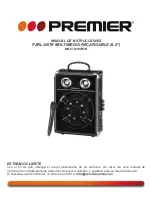
Part 1
New Construction Installation
1. This initial step should be completed after all structure framing is completed, and
prior to drywall installation. In this instance, a Pre-Construction Bracket Kit, such
as MCM #50-6682A (sold separately) must be utilized. These brackets mount to
wall studs, and in conjunction with drywall, provide a solid mounting base for the
speaker. Compatible with wood or metal studs spaced at standard 16” centers, the
kit also includes extension rails for studs mounted on 24” centers.
2. When positioning the pre-construction bracket between the studs, added care
should be taken to ensure that the bracket is level. A standard bubble level, such
as MCM #22-7572 or similar, model is essential to achieving this.
3. Centering the speaker opening between the studs, mount the Pre-Construction
Bracket to the studs.
4. If installing the speakers high on the wall, be sure to leave sufficient wire length at
the speaker end to reach to almost the floor. This greatly adds safety, as the
speaker may then be connected to the wire while standing on the floor instead on
top of a ladder. Coil the speaker wire and staple to the side of the stud above the
bracket. Take care to ensure that it does not interfere with drywall installation.
5. Once the drywall has been installed, a 12-3/4" x 8-1/2" opening should be cut to
match the hole in the pre-construction bracket. In most cases, the drywall installer
will do this at the same time that openings are cut for light switches, outlets and
ceiling fixtures.
1. Skip directly to Part 2
Installation in Completed Structures
1. For this type is installation, a stud finder such as MCM #22-9350 is highly
recommended. This device will not only accurately located both edges of the stud,
but will provide a warning of nearby electrical wiring.
2. When deciding on a final location to install in-wall speakers, extreme care should
be taken to ensure that obstructions do not exist, such as air ducts, plumbing and
electrical wiring.
3. Locate the wall studs between which the speaker will be mounted. Using a pencil,
mark a spot directly in the center of the two studs
4. Locate the rectangular cardboard mounting template, included with the speaker.
This template should measure 12-3/4" x 8-1/2". Using a tape measure, determine its
exact center point.
5. Poke a small hole in the template, and place the template on the wall, lining up the
hole with the spot marked on the wall. At this stage, it is helpful to use masking or
similar tape to temporally attach the template to the wall. Using a standard bubble
level, such as MCM #22-7572 or similar, make sure the template is in proper
position on the wall, and lightly trace its outer edge with a pencil.
6. Remove the template, and using a wallboard saw similar to MCM #22-7597, cut
along the pencil mark. This type of saw is especially useful, as its rigid design and
sharp point allow it to “plunge” into the wall with no need to drill a pilot hole.
When you have cut the length of each edge, remove the saw, and start a new line,
opposite the last cut edge. This will ensure much cleaner cuts at the corners.























